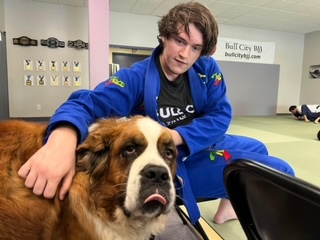It's been a minute since I have last blogged. Here's the Cliffs Notes version of my last 2 years of jiu jitsu:
1) I got my black belt!
2) My husband and I opened our own school!!!
We knew that opening a new school would give us the chance to cook up our own gym culture from scratch, so we thought hard about the environment we wanted to create. We decided that we prefer to keep things friendly and casual. And for us that means running a loose ship. Old school, traditional martial art formalities are so 2005, am I right?
And it's been great. Except one thing - when going out of town and visiting other schools, our students don't know how to act. They are committing cultural faux pas. Some even get in trouble.
I realize this is my fault. So I'd like to talk for a second about how to be a great guest at another academy.
How to be a Great Jiu Jitsu Guest
Email the school ahead of time. Avoid sticker shock by asking about the mat fee upfront. I've been to many schools that don't charge a fee to visitors but I have also been to schools that charge as much as $40 for open mat. It's also a good idea to ask about the dress code. What colored gis are allowed? When in doubt, the most widely accepted attire is a white gi (without your home gym logo), with shorts and a rash guard underneath.
Read the room. Gauge the formality level of the school by observing what others do. Are people bowing on and off the mat? Do white belts ask upper belts to roll? No one ever gets in trouble for being too polite, so better to err on the side of formality. Do not ask the black belts to roll unless that is the norm at the school.
If there is a gym dog, pet the gym dog.
Match your partner's intensity. My friend suggests that on a scale of 1-3, with 1 being a flow roll and 3 being a tough scrap, start at level 2. This way, you can easily level up or down as necessary when you feel your partner's intensity. If you start at 1 and they start at 3, you might get smashed too quickly to recover. If you start at 3 and they start at 1, they will wonder why you are so agro. To be extra polite, if you are much bigger than your partner or much more advanced, yield top position and start the roll at level 1.
Don't talk politics. Drama between schools and affiliations is real. There may be someone in their lineage who doesn't like someone in your lineage. Don't get involved.
Pet the gym dog again.
Help new students but don't over step. Answer questions or show techniques when asked but do not coach over the instructor.
Don't do anything illegal. If a submission is illegal for you or your rolling partner, now is not the time to play around with it. Also do not attack injured joints.
If there is a jar of treats, ask if you can give the gym dog a treat.
Help clean the mats. They may not let you, but at least offer.
Leave a positive review. Nothing says thank you for the hospitality like leaving a 5 star review!









